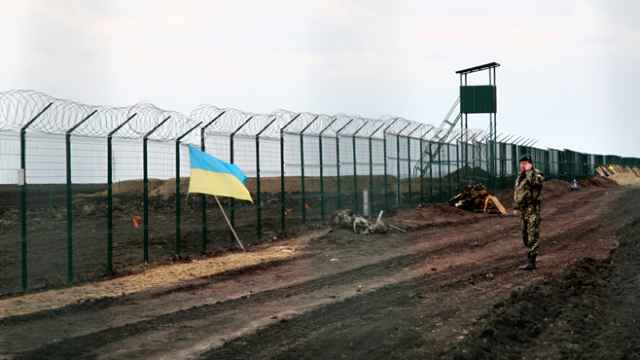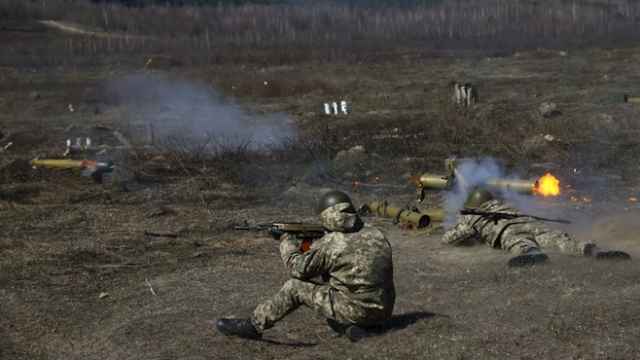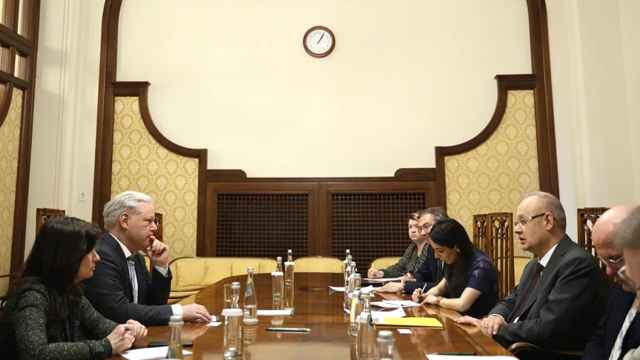MINSK/KIEV — Ukraine's President Petro Poroshenko has warned of a growing threat of large-scale military action in the east of the country, but peace envoys reported some progress towards full implementation of a fragile cease-fire agreement.
Earlier Ukraine's military said five of its servicemen had died in the past 24 hours, while pro-Russian separatist officials said three rebel fighters had been injured in the same period in attacks from the Ukrainian side.
Casualties are reported almost daily despite the truce, brokered in February in the Belarussian capital Minsk to end a year-old conflict in which more than 6,000 have been killed.
"The threat of large-scale military action from Russian terrorist groups not only remains but is growing," Poroshenko told a security and defense council meeting in Kiev.
He said there were more than 40,000 separatist fighters in the rebel-controlled territories and a further 50,000 Russian troops across the border, according to a statement posted on his website.
Later, the security council said it had approved plans to "accelerate the construction of fortified lines and borders" to improve Ukraine's defenses, according to an online statement.
Military spokesman Andriy Lysenko said four Ukrainian servicemen had been killed by a landmine and a fifth in a rebel ambush since Tuesday.
But envoys meeting in Minsk on Wednesday to explore ways of shoring up the cease-fire struck a more upbeat note.
"The work was constructive, laying the foundation for talks and decision-making at the negotiating table and not on the battlefield," Heidi Tagliavini of the OSCE rights watchdog told a briefing after the talks.
Also attending the Minsk meeting were representatives from Russia, Ukraine and the pro-Russian separatists.
Russia's envoy, Azamat Kulmuhametov, said the talks represented a "serious step towards a political settlement" to the conflict.
"What has been done today … will promote the cease-fire."
He and the separatist envoys said the meeting had addressed administrative issues such as pension payments and the reopening of banks in rebel-controlled areas of eastern Ukraine.
International aid organizations have warned of a brewing humanitarian crisis in many parts of the rebel-held east, where thousands of vulnerable people including the elderly have been cut off from social subsidies as a result of the conflict.
Kiev's representative at the peace talks, former Ukrainian president Leonid Kuchma, emphasized the need for a total cessation of violence.
"For us the most important thing today is a complete cease-fire," he said.
A Message from The Moscow Times:
Dear readers,
We are facing unprecedented challenges. Russia's Prosecutor General's Office has designated The Moscow Times as an "undesirable" organization, criminalizing our work and putting our staff at risk of prosecution. This follows our earlier unjust labeling as a "foreign agent."
These actions are direct attempts to silence independent journalism in Russia. The authorities claim our work "discredits the decisions of the Russian leadership." We see things differently: we strive to provide accurate, unbiased reporting on Russia.
We, the journalists of The Moscow Times, refuse to be silenced. But to continue our work, we need your help.
Your support, no matter how small, makes a world of difference. If you can, please support us monthly starting from just $2. It's quick to set up, and every contribution makes a significant impact.
By supporting The Moscow Times, you're defending open, independent journalism in the face of repression. Thank you for standing with us.
Remind me later.





